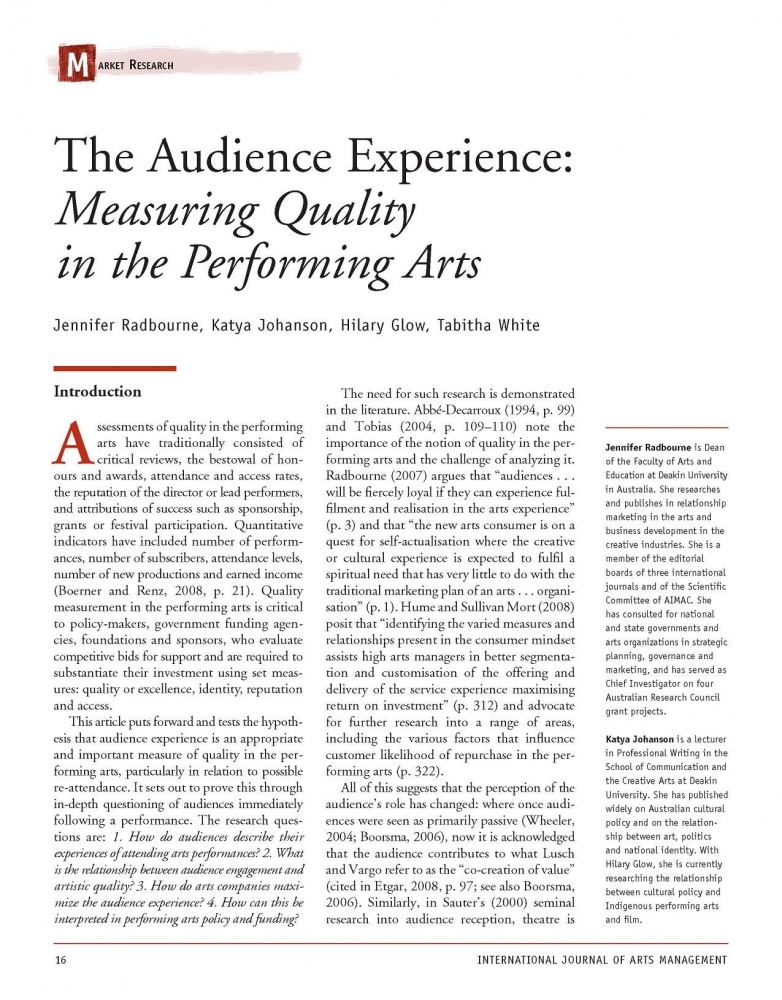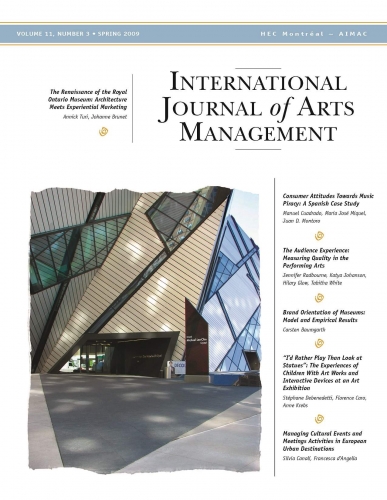The Audience Experience: Measuring Quality in the Performing Arts
Produit: Article
21,00 $ CA
Jennifer Radbourne, Katya Johanson, Hilary Glow, Tabitha White
Jennifer Radbourne is Dean of the Faculty of Arts and Education at Deakin University in Australia. She researches and publishes in relationship marketing in the arts and business development in the creative industries. She is a member of the editorial boards of three international journals and of the Scientific Committee of AIMAC. She has consulted for national and state governments and arts organizations in strategic planning, governance and marketing, and has served as Chief Investigator on four Australian Research Council grant projects.
Katya Johanson is a lecturer in Professional Writing in the School of Communication and the Creative arts at Deakin University. She has published widely on Australian cultural policy and on the relationship between art, politics and national identity. With Hilary Glow, she is currently researching the relationship between cultural policy and Indigenous performing arts and film.
Hilary Glow is Senior Lecturer and Director of the Arts and Entertainment Management Program at Deakin University. She researches in the field of arts and cultural policy and is the author of Power Plays: Australian Theatre and the Public Agenda (2007), a study of contemporary Australian theatre.
Tabitha White is currently funded by VicHealth to undertake a doctoral study on the impact of art on individuals. She has worked on various research projects at Deakin University and has lectured in the arts management programs at Deakin University and the University of Melbourne. She has also worked in the arts sector in Australia and the United States, including curatorial, public programs, research and writing.
ABSTRACT
Traditional measures of quality in the performing arts include critical reviews, awards, attendance data, the reputation of the director, company or lead performers, and attributions of success such as festival participation or sponsorship and grants. However, the recent literature on audience values, quest for authenticity and the personal experience suggests the need for empirical research into the capacity of the audience experience as an appropriate and important measure of quality in the performing arts. The authors use primary research with performing arts audiences to explore notions of quality, audience risk and audience experience to redefine the quality-measurement paradigm.
KEYWORDS
Performing arts, quality, measurement, audience experience, audience risk
RÉSUMÉ
Les critères d’évaluation de la qualité dans le secteur des arts de la scène sont habituellement les critiques positives dans les médias, les prix ou les honneurs reçus, une hausse du taux de fréquentation, la notoriété du directeur, de la compagnie ou des principaux interprètes et les succès obtenus, comme l’obtention de commandites ou de subventions ou encore la participation à un festival. Toutefois, la littérature récente sur les valeurs du public – quête d’authenticité et d’expérience personnelle – montre la nécessité d’une recherche empirique sur la possibilité que l’expérience du public soit une mesure pertinente et importance de la qualité dans le domaine des arts de la scène. Les auteures effectuent une recherche sur le terrain auprès de publics des arts de la scène pour explorer la notion de qualité, le risque assumé et l’expérience du public en vue de redéfinir le paradigme qualité-mesure.
MOTS CLÉS
Arts de la scène, qualité, mesure, expérience du public, risque assumé par le public
RESUMEN
Las medidas tradicionales de calidad en las artes escénicas incluyen críticas, premios, datos de asistencia, reputación del director, la compañía o los artistas principales, manifestaciones del éxito como participación en festivales, patrocinios y subvenciones. Sin embargo, la reciente documentación sobre valores del público, búsqueda de autenticidad y experiencia personal presenta la necesidad de una investigación empírica sobre la capacidad experiencial por parte del público como una medida apropiada e importante de la calidad de las artes escénicas. Los autores basan principalmente la investigación en públicos de artes escénicas para explorar las nociones de calidad, riesgo del público y experiencia del mismo de manera a redefinir el paradigma de evaluación de la calidad.
PALABRAS CLAVE
Artes escénicas, calidad, medida, experiencia del público, riesgo del público

